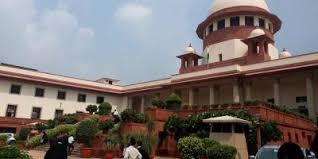The identical allegation in both the proceedings was that the Appellant altered his date of birth from 21.04.1974 to 21.04.1972 in his 8th standard marksheet. It was alleged that this was done to project himself as having attained majority at the time of the recruitment. (Para 3)
Asked about the overwriting in the application, the appellant stated that it was possible that in the application form he might have written initially as 21.04.1974 and thereafter corrected it to 21.04.1972. He however maintained that his date of birth was 21.04.1972. (Para 4)
The Enquiry Officer in the departmental proceeding found the charges proved and the Disciplinary Authority, by an order of 31.03.2004, dismissed the appellant from service. The Appellate Authority also dismissed the appeal. Attempts to have the order reviewed and the penalty reconsidered were also in vain. (Para 5)
At the criminal trial, the trial Court convicted the appellant for the offence under Section 420 of the IPC and sentenced him to undergo three years’ imprisonment alongwith a fine of Rs.5,000/-. However, the Additional District and Sessions Judge, Jodhpur [‘Appellate Judge’], vide judgment dated 24.08.2007, allowed the criminal appeal and acquitted the appellant. (Para 6)
The learned Single Judge, by his judgment dated 13.08.2008, dismissed the writ petition by holding that the standard of proof in a criminal proceeding and departmental proceeding is different. (Para 8)
The following two questions arise for consideration
a) Whether the dismissal of the appellant from service pursuant to the departmental enquiry was justified?
b) On the facts of the case, what is the effect of the acquittal, ordered by the Appellate Judge in the criminal trial, on the order of dismissal passed in the departmental enquiry? (Para 9)
We are also conscious of the fact that mere acquittal by a criminal court will not confer on the employee a right to claim any benefit, including reinstatement. (Para 12)
However, if the charges in the departmental enquiry and the criminal court are identical or similar, and if the evidence, witnesses and circumstances are one and the same, then the matter acquires a different dimension. (Para 13)
It is very clear that relevant and material evidence being, the deposition of PW-5/Raj Singh; the marksheet of 8th class of the appellant [enclosed to the chargesheet] and the original marksheet independently marked as Ex. D3 by the defence have been completely left out in the discussion and consideration. (Para 21)
we are inclined to accept the explanation given by the appellant that overwriting in the application form was only due to correction of an inadvertent error. As long as the original 8th standard marksheet reflected his date of birth as 21.04.1972 and there is no correction or manipulation in that document, the appellant cannot be penalised. (Para 22)
This issue need not detain us any further because it is not the case of department that the appellant sought employment based on 10th standard marksheet. It is their positive case that the appellant sought employment on the basis of his 8th standard marksheet. Shravan Lal-PW-4 in the departmental enquiry had also furnished the 10th standard marksheet procured from the Secondary Education Board, Ajmer. In cross-examination, on being asked, he admitted that the appellant was recruited on the basis of 8th standard marksheet, and he admitted that there was no alteration in the 8th standard marksheet. (Para 29)
We declare that the order of termination dated 31.03.2004; the order of the Appellate Authority dated 08.10.2004; the orders dated 29.03.2008 and 25.06.2008 refusing to reconsider and review the penalty respectively, are all illegal and untenable. (Para 30)
SUPREME COURT OF INDIA
2023 STPL(Web) 462 SC
[2023 INSC 1047]
Ram Lal Vs. State Of Rajasthan & Ors.
Civil Appeal No. 7935 of 2023 (Arising out of SLP (C) No. 33423 of 2018)-Decided on 04-12-2023
https://stpllaw.in/wp-content/uploads/2023/12/2023-STPLWeb-462-SC.pdf







